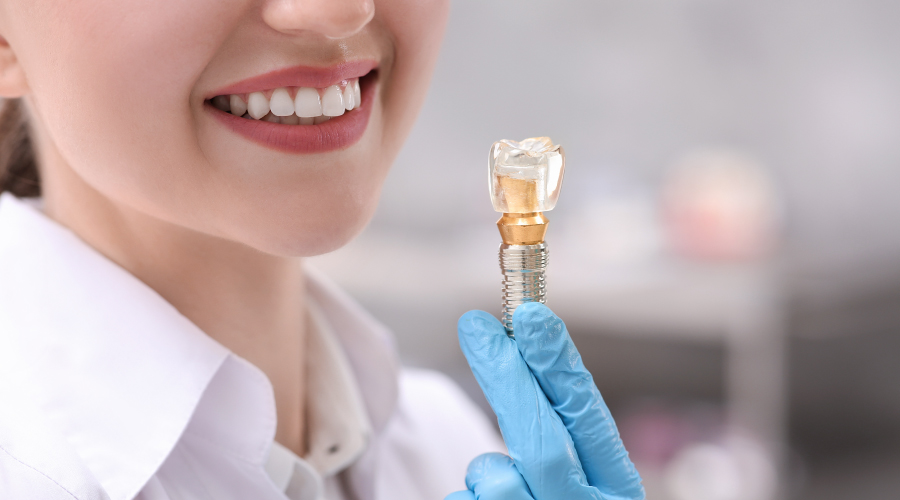

Dental implants have become a popular solution to tooth loss in the dental practice since they are permanent solutions. They are strong, long-lasting and aesthetically pleasing, which is why many people who want to get their smile back turn to them. However, there are some things that one needs to know before going for dental implants, these include – the different types of dental implants, its side effects, and the total cost. For teeth strengthening, you can also consume calcium tablets as recommended by your dentist.
In this detailed guide, you will learn all the information you need to know regarding this.
What are Dental Implants?
Dental implants are surgical fixtures placed into the jawbone that are made of titanium or zirconia to mimic the natural tooth roots. They act as a base for the fixed or removable prosthetic dentition that is made to mimic your natural teeth. The process is divided into several steps – appointment, implantation, osseointegration, which is the process of implantation of the implant into the jawbone, followed by placing abutment on implant and the final step is the placement of the crown.
Types of Dental Implants
There are various kinds of dental implants and each is appropriate for a specific circumstance. It is, therefore, important to understand the differences so that one can make the right decision. let’s have a look at it here:
Endosteal Implants
They are the most frequently used type of dental implants. They are usually in the form of small screws and are inserted into the jawbone. After the gum tissue around the implant has healed, another surgery is required to attach a post to the implant. Last of all, a crown or a denture is placed on the post to complete the artificial tooth or teeth.
Subperiosteal Implants
These are used when there is no sufficient quantity of healthy jawbone to support endosteal implants. Subperiosteal implants are similar to endosteal implants but are fixed under the gum but above the jawbone. A metal frame is placed on the jawbone and as the gums start to grow, they attach themselves to the frame and become a part of the jawbone. They are fixed on the frame and extend through the gums where artificial teeth are then placed on.
Zygomatic Implants
These are less frequent and are applied when there is not enough jawbone for endosteal implants and the patient cannot or does not wish to have bone augmentation procedures. Zygomatic implants are inserted in the cheekbone or the zygomatic bone not in the jawbone.
Possible Risks of Dental Implants
Dental implants are relatively safe and have a high success rate; however, they are not without complications. One should be aware of these tooth implant side effects before going for the procedure:
Infection
Like any other surgery, there is always a possibility of infection at the area where the implant is placed. This risk can be reduced by proper brushing and flossing and by adhering to the dentist’s instructions on post-operative care.
Injury or Damage to Surrounding Structures
This can be to other teeth, blood vessels or the jawbone in case of severe impacts or falls. Sometimes, the implant placement may interfere with the sinus cavities especially if it is located in the upper jaw.
Nerve Damage
This can lead to pain, numbness or tingling sensation in the teeth, gums, lips or chin. This risk has to be minimised and it is for this reason that one has to ensure that he or she selects an experienced dental surgeon.
Implant Failure
In some cases, the dental implant may not bond with the jawbone as expected, and this is a failure. Some of the conditions that may lead to implant failure are smoking, poor hygiene and diseases, such as diabetes.
Sinus Problems
In the case of implants installed in the upper jaw, the implants may extend into the sinus cavities and this may cause sinus complications.
Advantages of Dental Implants
However, the advantages of permanent dental implants tend to outweigh the disadvantages in most cases for the patients. Some of the key benefits include:
Durability
Dental implants are made to be long-term solutions. If well maintained, they can serve a lifetime and therefore are a long-term solution to the problem.
Natural Appearance
Implants are made to blend with your other teeth and feel like your natural teeth. These are made to fit the colour, shape and size of your natural teeth so that they blend in perfectly with your teeth.
Improved Oral Health
Dental implants do not have any impact on the neighbouring teeth as opposed to dental bridges that involve the reduction of adjacent teeth. This is beneficial in keeping your general oral health in check.
Enhanced Comfort and Convenience
Unlike removable dentures, implants are fixed structures that are screwed into your jawbone, therefore no more sore gums or taking out and cleaning of the dentures. No glue is required, and you can eat, speak and smile without any worries.
Bone Preservation
Dental implants also assist in maintaining the jawbone, which is not the case when one has missing teeth. This assists in the support of your facial structure and shape.
Conclusion
Dental implants are one of the most successful and efficient methods of tooth replacement. They have many advantages, such as being long-lasting, aesthetically pleasing and healthy for the teeth. However, one needs to know the kind dental implants that are available, the side effects that may be encountered and the total dental implants cost. It is recommended that you seek advice from a professional dentist to find out if these implants are suitable for you and how to go through the process to achieve the best results.




